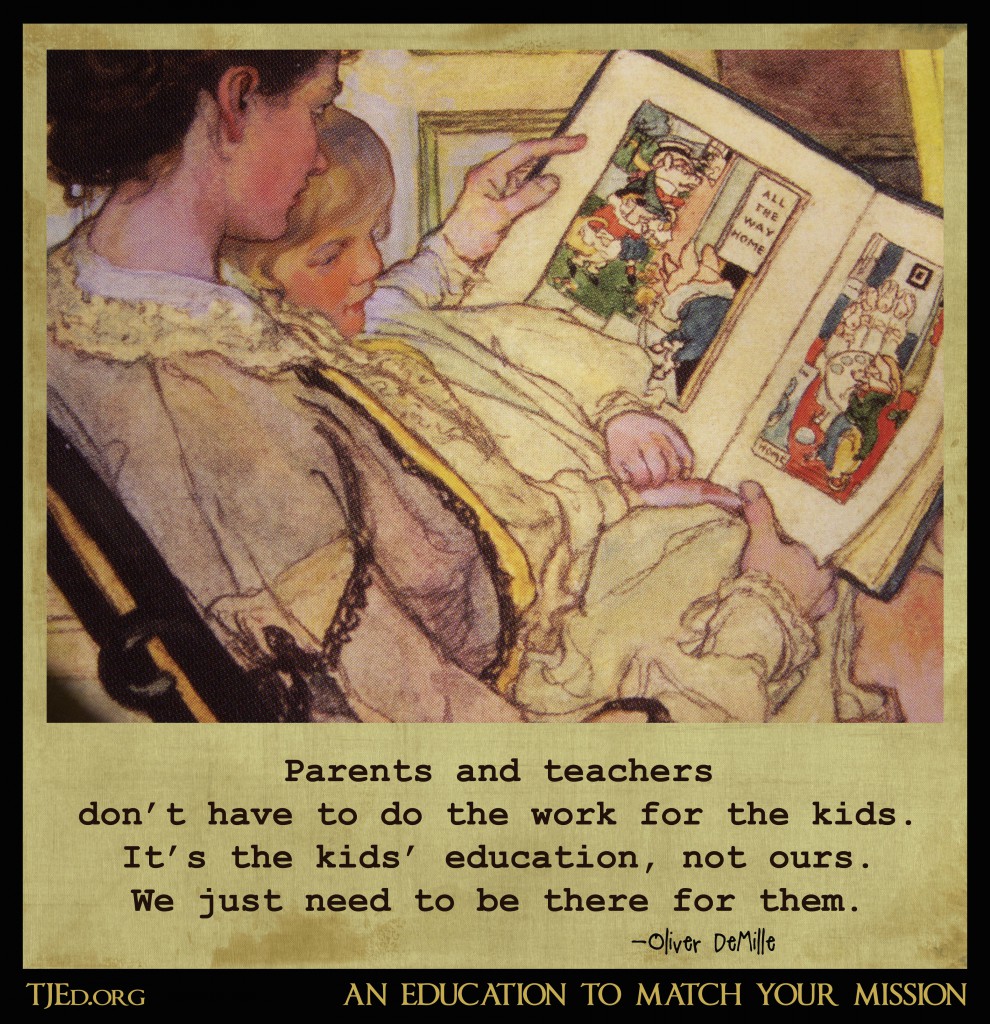An Essential Core Phase Skill for Every Parent
Aha!
It has happened to all of us.
We’re going about our lives, doing the things we do every day, and then suddenly, as if from nowhere, we experience a Paradigm Shift! An epiphany! A sudden burst of new thinking! A light bulb turns on in our brain!
“Eureka!” Or, in twenty-first century language: “No way!”
When this happens, everything is different. It’s like the old bumper sticker that reads, simply, “Change Happens!”
It really does. When a genuine Paradigm Shift comes, nothing is ever the same.
For example, this happened to me one day while I was reading a book. I don’t remember what the book was, or even what it said, because the Eureka moment came from a book my wife was reading.
I’m not sure why, but one of the things we love to do together is read. I have a stack of books, and so does she—and we just read at the same time in the same room. Weird, maybe. But cool.
Then, every once in a while (several times an hour, at least), one of us gets excited and starts sharing what we’re learning with the other person. It’s a lot of fun. Call me crazy, but this is a great date. It really is. Not lame, not rote. Always new, always interesting, and always exciting. Always bursting with spontaneity. Very personal. (Don’t knock it if you haven’t tried it! This really works!)
Schooling or Learning
Anyway, we were sitting in our living room reading some years ago, when Rachel looked up from her book and exclaimed, “No Way!”
“What?” I asked.
“This may be the most amazing thing I’ve ever read about education.”
I immediately closed my book and gave her my full attention. She isn’t prone to exaggeration—quite the opposite—so her declaration was intriguing.
“Okay,” she began. “I’m reading John Holt on how to teach young children to read. Listen to this…”
She summarized in her own words: “You’re sitting with a child who wants to learn to read, or is just learning, or recently learned and is practicing. You watch and listen while she tries to sound out the words in a book.
For example, she reads: ‘Cam ran to watch the plane.’ Or, actually, ‘Caaaaammmmm.’ Long pause. ‘rrrrrrr…’ Long pause. ‘rrrrruuu, wait. rrrrrraaaa…’
 “At this point you are just dying to take over and read it for your daughter. It’s an adult thing. We think we have to dominate everything. So you say, ‘Cam ran. That’s what it says. Cam ran…to…watch…’”
“At this point you are just dying to take over and read it for your daughter. It’s an adult thing. We think we have to dominate everything. So you say, ‘Cam ran. That’s what it says. Cam ran…to…watch…’”
Rachel took a deep breath and continued. “If you have a very obedient child, Holt tells us, she’ll just stop reading and listen to you read. But you already know how to read, so how is this helping her learn to read? Truth—it’s not.
“You’re just getting in her way. You’re putting schooling above learning. You’re doing what adults too often do—substituting your quick, efficient, get-the-job-done attitude for her need to slowly, methodically, even laboriously do the work of learning.”
Balancing
Rachel looked up at me to see if I was getting this. “Wow!” I said. “This is deep. But also incredibly obvious.”
“It’s hard not to interrupt that way,” she replied. “We adults just naturally think that helping the kids learn means doing it for them. It’s so engrained in our minds and hearts.”
“What else does he say?”
“Well, the main message is that ‘less is more.’ He gives a bunch of examples, but it boils down to less is more.”
“What examples?”
“Okay. Here’s one. You can walk away, go do the dishes or clean the garage, leaving your daughter to read on her own. After realizing that less is more, this plan would seem to be okay. But it isn’t. Her response will be, ‘Oh, too bad. I wanted Mom to help me learn. But she doesn’t seem to value it very much, so she’s gone to do chores. I guess I’ll put this book down and go do something else.’”
“Brilliant!” I said. “So Holt wants us to sit there, stay with the student, but just listen and let the student do the learning. Not leave. But also, not lecture. Right?”
“Exactly. And he goes on. Say the daughter turns to you and asks, ‘I got the Cam part, and rrrrrrr, but I’m stuck. How do I say it?’ Again, our natural adult response is to read it to her: ‘Cam ran to see the plane.’ But that’s wrong, in most cases. Better to say, ‘You can do this, honey. Keep trying.’ Right?”
“Right,” I said.
“Wrong! Holt says that when we start giving commands the student thinks, ‘Oh, too bad. I wanted to learn. Instead I have to do what Dad tells me. I guess I’ll have to learn some other time.’”
“But I just told he she can do it!”
“Holt says that in her language what you actually said was, ‘You need to do this.’”
I pondered this for a second, then nodded in agreement. “He’s right. Wow! I never thought of it like that. But what do you do, then?” I asked.
“That’s where it’s so brilliant! You smile, and you repeat what she just said: ‘Cam rrrrrrr…’ Then you stop, leaving her the space to finish the sentence.”
That’s when the “Eureka!” hit me. I’ve never been the same since that moment. That’s great education, I knew.
Something clicked.
Reflecting Education
I turned to Rachel. “Wow! It’s like Covey teaches in 7 Habits. It’s the ‘Seek First to Understand’ habit, where he says to really listen, and that the key to really listening is to reflect back to the other person what he just said. Not elaborating on his words. Not asking questions that move the conversation in a different direction. Just reflecting by repeating what he just said. And Holt is actually educating this way!”
“It’s so perfect…” she whispered.
“Yes, it is. But it’s more than that. It’s a whole educational philosophy. Parents and teachers don’t have to do the work for the kids. It’s the kids’ education, not ours. We just need to be there for them, set a good Montessori-style example of reading and studying so they know it’s important, and then give them attention—sitting with them while they get started, and reflecting back as they learn, so they’ll know we’re helping them. But giving them the actual space to really learn for themselves!”
“Yes,” she said, “It’s what Covey called active listening.”
I nodded in amazement. I knew my views on education would never be the same. The paradigm shift hit me, took hold, and is still growing so many years later.
Today I read an article in The Wall Street Journal entitled “The Wrong Way to Treat Child Geniuses: Former prodigies like me need less attention, not more.”
It brought me back to John Holt, and the memories came pouring in. But enough history.
The principle is the key point: Less really is more.
Since all students have genius inside, great education means helping them get a great education, not trying to give it to them.
Did you get that? It’s so powerful, yet so different than the conveyor belt. Most of us don’t really get it, even when we hear it.
Great education means helping the student get a great education himself, not trying to give it to them. This is so important.
Great mentors learn how to 1) sit with the beginning learner while he or she learns, helping but never hindering, and 2) simultaneously let the learner learn without trying to take over the learning and turn it into an adult-friendly schooling session.
When you learn to do these two things, you’ll be a truly great mentor!


































After I read this, I was excited to try it right away, so I got a book and went to read where my kids were playing and looking at a hidden picture in a magazine. Soon my oldest got a book of her own and was trying to read it. As she got stumped she asked me what the word was. I invited her to sit by me. I tried to do what this article says, and it was HARD to not jump in with the right word or sound. What do you do when a child adds letters or sounds to words, like L in a phrase “Peter Pepper’s Puppy”? I let her keep going, but wondered, “What do I do now?”
How old is the child?
7 years old.
I have a question. How does this translate to helping with a physical skill? For example, I have a toddler who is learning to do zippers and buttons, and put on his own shirt and jacket. When he get’s stuck, I usually either say “You can do it” or give a bit of a tug here or there to help him keep his momentum. That seems to be exactly like those instincts mentioned for the reading example, to either push too hard or finish the task. Do I let him experience the frustration of not being able to do it? Do I wait for him to ask for help?
For questions like these I always like to have a variety of responses. I encourage you to post your question to our discussion group: http://facebook.com/groups/tjeddiscussion